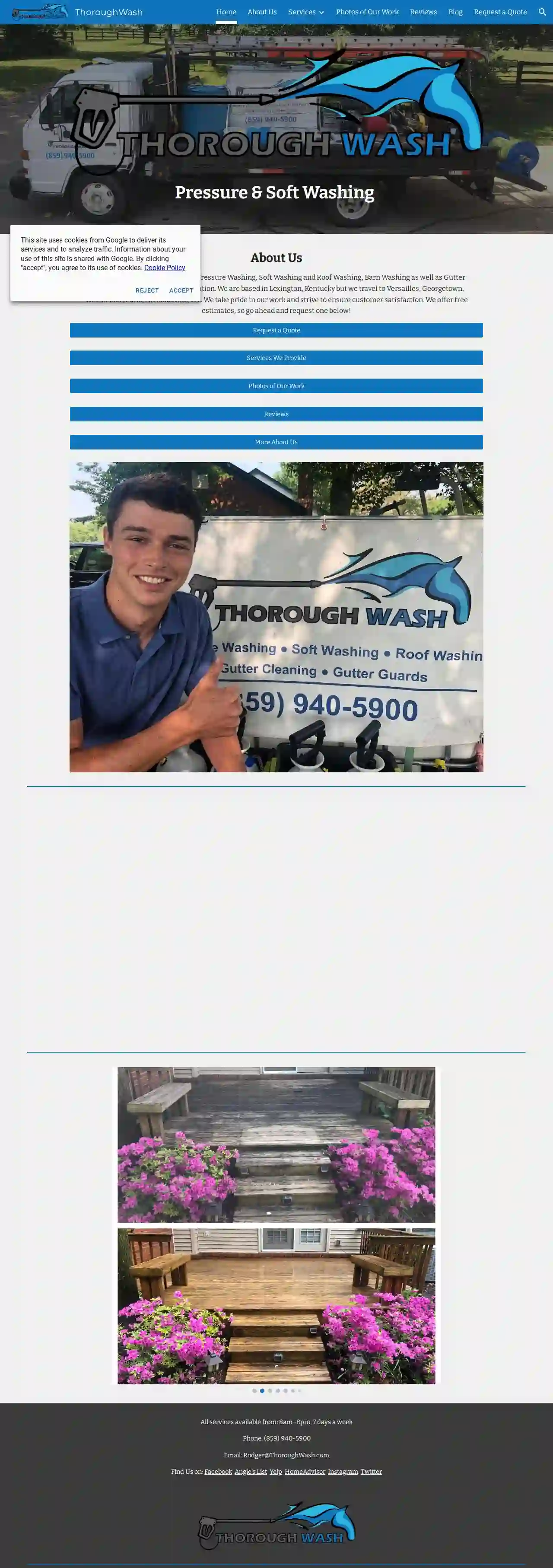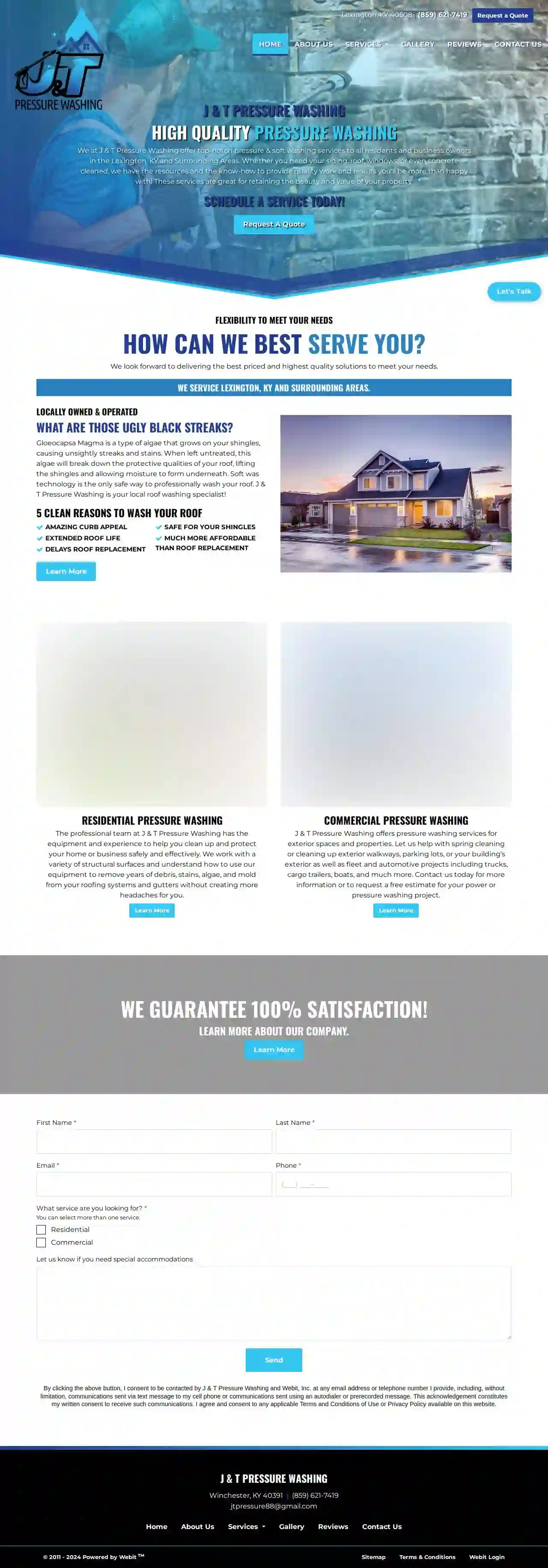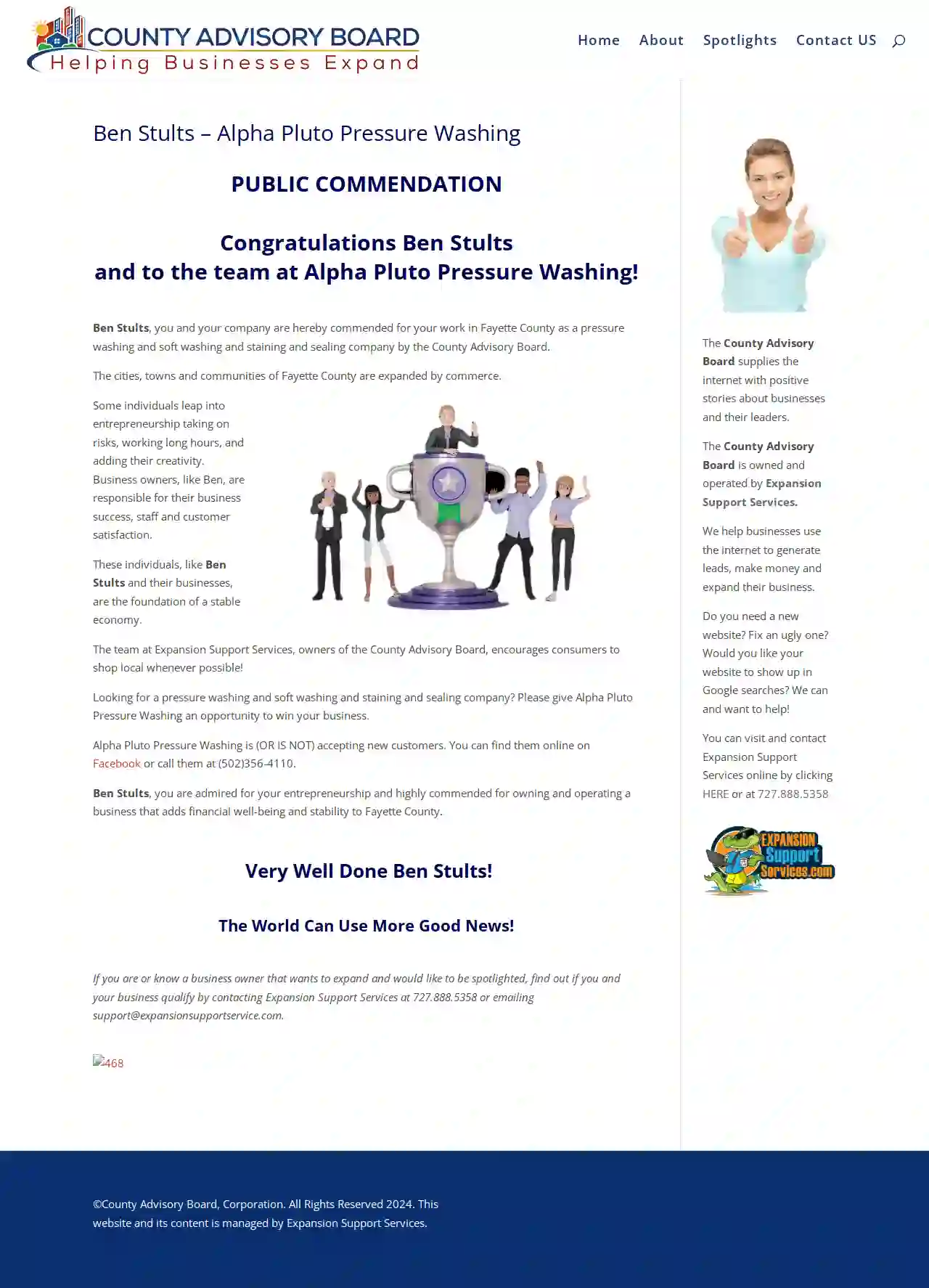Pressure Washing Edgewood
Top Deck and Fence Cleaning in Edgewood
Get multiple Pressure Washing quotes for your project today! Compare profiles, reviews, accreditations, portfolio, etc... and choose the best deal.

SC Pro Wash
533 reviews101 S Lake Drive, Lexington, 29073, USSC Pro Wash offers a variety of pressure washing services and soft washing services for all types of clean up and curb appeal projects. We are a locally owned and operated pressure washing contractor with the equipment and expertise to wash and clean everything including driveways and walkways; concrete, brick, pavers; and all kinds of residential or commercial cleaning projects. Our team of cleaning technicians are dedicated to your complete satisfaction. So, if you're looking for a pressure washing contractor to provide quality, affordable exterior cleaning in the Lexington County and Richland County SC area, contact SC Pro Wash for a free estimate.
- Services
- Why Us?
- Our Team
- Testimonials
- Gallery
Get Quote
High Fidelity Pressure Washing
530 reviews3404 Captiva Court, Lexington, 40509, USThe Pressure Washing Experts You've Been Looking For Schedule Your FREE Estimate Today! Get A Free Quote 859-410-3404 Top Notch Lexington Pressure Washing Company! Welcome to High Fidelity Pressure Washing, the home of quality pressure washing services right here in Lexington and beyond! We are a small business with big goals and even bigger in quality of services. We strive to be your one-stop-shop for all things pressure washing-related. More About Us House Washing Driveway Washing Sidewalk Cleaning Commercial Pressure Washing Why Pressure Wash Your Home? Over time, your home accumulates a lot of dirt, grime, and other pollutants. All of these pollutants can lead to pretty extensive damage and potential health risks for you and your family. Not just that, but it just doesn't look good to have a dirty home. Keeping a clean exterior of your home boosts your curb appeal, keeps away health risks, and helps retain the integrity of your home's structure by repelling pollutants and buildup that can lead to structural damage, such as water damage. Pressure washing your home is one simple way to help keep your home clean and healthy. Contact Us Today Our Complete Washing Services High Fidelity Pressure Washing is proud to have a wide and extensive array of pressure washing services. We are able to cater to the needs of every home and business that comes to our doorstep. These services include: House Washing Driveway Washing Deck Washing Pool Deck Cleaning Fence Washing Retaining Wall Cleaning Sidewalk Cleaning Commmercial Pressure Washing More Services Towns Served High Fidelity Pressure Washing serves a pretty wide area and the towns that we serve include: Lexington Georgetown Nicholasville Versailles Richmond Midway Paris More Towns
- Services
- Why Us?
- Gallery
Get Quote
ThoroughWash Pressure & Soft Washing
511 reviewsLexington, USThoroughWash Pressure & Soft Washing is a Lexington based business which was founded in 2020. Although the business is relatively new, all of our employees have multiple years of experience in the field. We are fully insured and our main goal is keeping our customers happy! We specialize in pressure washing, soft washing, roof washing, gutter cleaning and gutter guard installation. We offer prices which are hard to beat, quality that is unmatched, exceptional customer service and free estimates. So go ahead and request a quote today!
- Services
- Why Us?
- Gallery
Get Quote
J&T Pressure Washing LLC
Lexington, 40508, USJ & T Pressure Washing is a locally owned and operated pressure washing contractor serving Lexington, KY and the surrounding areas. We offer a variety of residential and commercial cleaning services, including siding, roof, and much more. Our team is dedicated to delivering professional cleaning and friendly customer care for an exceptional customer experience. We utilize soft wash technology, a low-pressure, solution-based cleaning method that is safe for your property. Whether you need your home or business refreshed, J & T Pressure Washing is your trusted partner for all your pressure washing needs. Contact us today for a free estimate and let us help you maintain the beauty and value of your property.
- Services
- Why Us?
- Gallery
Get Quote
Patriot Mobile Wash
4.67 reviews1416 Fabricon Blvd, Unit C, 1416 Fabricon Blvd; Unit C, Jeffersonville, 47130, USPatriot Mobile Wash is a family-owned and operated business dedicated to providing professional mobile washing services for both commercial and residential customers. We pride ourselves on our commitment to honesty, transparency, and building strong relationships with our clients. Our team takes the time to understand your individual needs and provide customized solutions that exceed your expectations. We offer a wide range of services, including power washing, roof washing, commercial washing, concrete cleaning, gutter cleaning, janitorial services, street sweeping, and new epoxy flooring. We are fully insured and guarantee our service, price, and expertise.
- Services
- Why Us?
- Our Team
- Testimonials
- Gallery
Get Quote
Alpha Pluto Pressure Washing
514 reviews123 Main St, Suite 100, Louisville, 40203, USThe County Advisory Board is a national organization helping business owners across the 3,143 US Counties have well-run, productive and profitable companies. It promotes involvement in local chambers, Little League, networking groups, business associations, fantasy football clubs, the Girl Scouts and every other sane opportunity for businesses, groups, associations and individuals. The County Advisory Board is not part of the any county government agency, your Chamber of Commerce, Better Business Bureau or other social organizations, but strongly suggests that all businesses join their local Chamber and/or other various business organizations.
- Services
- Why Us?
- Accreditations
- Our Team
- Testimonials
- Gallery
Get Quote
Hydrosphere Services
518 reviewsLexington, USAt Hydrosphere Services, our commitment to providing superior exterior pressure washing and environmental cleaning services is unmatched in Lexington,KY. We understand the transformative power of a clean exterior. Whether it’s your home, business, or industrial space, our professional pressure washing services are here to rejuvenate and restore surfaces to their pristine condition. A clean exterior enhances the curb appeal of your property but also protects it from the damaging effects of mold, mildew, algae, and other contaminants. Plus, a well maintained residence helps decrease unexpected expenditures. We strive to meet the needs of our customers and deliver cleaning solutions that protect, clean, and maintain their property. Our Residential Exterior Cleaning Services include brick and siding, roofs, gutters, driveways, walkways, decks and patios. We also offer an extensive menu of Commercial Pressure Washing Services because we know a clean and well-maintained commercial property leaves a lasting impression on visitors. Commercial pressure washing projects are big tasks and we are well equipped to handle the most complex projects with our experienced staff and state- of- the- art equipment. Our commercial pressure washing services include building washing, apartment complex pressure washing, window washing, restaurant and underbar cleaning, parking lots and garages. You can rely on Hydrosphere Services for the most professional residential or commercial pressure washing service in Lexington,KY. Contact us today for your free estimate.
- Services
- Why Us?
- Testimonials
- Gallery
Get Quote
Kentuckiana Pro Wash
513 reviewsElizabeth, IN, 11594 Majestic Way SE, 47117, USAt Kentuckiana Pro Wash, we're proud to be the top choice for quality pressure washing services in Louisville and the surrounding areas. Whether you need residential or commercial pressure washing services, we have the skills and expertise to get the job done right. Our team of highly trained technicians uses state-of-the-art equipment and the latest techniques to ensure your property receives the best possible care. We take pride in our work and always go the extra mile to exceed our customers' expectations.
- Services
- Why Us?
- Our Team
- Testimonials
- Gallery
Get Quote
Professional Pressure Washing
5522 reviews123 Main St, Suite 101, Columbia, 29020, USProfessional Lawn Care Pressure Washing is a privately owned, full service pressure washing company providing many of your power washing needs. We offer our services to commercial areas as well as residential. We provide a high - quality and prompt service that will make your home or office shine! We will work with you on a price that fits your budget, and our work is 100% guaranteed. Our trained specialists applies both the art and science of the industry and will safely and effectively clean your property.
- Services
- Why Us?
- Accreditations
- Our Team
- Testimonials
- Gallery
Get Quote
Profusion Pressure Washing
4.958 reviewsLexington, KY, 1108 Pepperhill Cir., 40502, USProfusion Pressure Washing is the leading pressure washing provider for Lexington and surrounding areas. Our Services include pressure washing to your homes, roofs, driveways, sidewalks, decks, and fences. We use state-of-the-art equipment, soft washing techniques, and curated cleaning products to deliver lasting results that increase the durability and longevity of your home.
- Services
- Why Us?
- Our Team
- Testimonials
- Gallery
Get Quote
Over 60,241+ Cleaning Contractors on our directory
Our cleaning pros operate in Edgewood and surroundings!
CleaningMatch has curated and vetted Top Janitorial Businesses near Edgewood. Find a top & trustworthy business today.
Frequently Asked Questions About Pressure Washing
- Clear Obstructions: Remove any objects, furniture, or debris from the areas to be pressure washed.
- Close Windows and Doors: Securely close all windows and doors to prevent water or cleaning solutions from entering your home or building.
- Cover Delicate Surfaces: Protect delicate plants, landscaping, or electrical outlets with tarps, plastic sheeting, or painter's tape.
- Inform Your Neighbors: It's a courtesy to inform your neighbors about the scheduled pressure washing, especially if noise or overspray is a concern.
- Communicate Special Instructions: Inform the pressure washing company about any specific areas you want them to focus on or avoid.
- Wood Siding: High-pressure washing can damage wood fibers, leading to splintering or etching. Soft washing is the recommended method for cleaning wood siding.
- Asphalt Shingles: High-pressure water can dislodge granules from asphalt shingles, reducing their lifespan. Soft washing is a gentler alternative for roof cleaning.
- Painted Surfaces: High pressure can strip paint from surfaces. Always test pressure washing on an inconspicuous area before cleaning painted surfaces.
- Windows and Screens: The force of pressure washing can break windows or damage delicate window screens. Traditional cleaning methods are better suited for windows and screens.
- Pressure Washing: For hard surfaces like concrete, brick, or decks, pressure washing can effectively remove mold and mildew. Use a cleaning solution containing bleach or mildewcide for optimal results.
- Soft Washing: For delicate surfaces like roofs or siding, soft washing is the preferred method for mold and mildew removal. Soft washing uses low-pressure water and specialized cleaning solutions to gently remove mold and mildew without damaging the surface.
- Prevention: After cleaning, take steps to prevent future mold and mildew growth by addressing moisture issues, such as fixing leaks, improving ventilation, and trimming vegetation that creates shade and traps moisture.
- Pressure Washing: If your siding is in good condition but dirty or stained, pressure washing can effectively restore its appearance without the need for painting.
- Painting: If your siding is faded, chipped, peeling, or damaged, pressure washing alone may not be sufficient. Painting provides a fresh coat of protection and a new look.
- Pressure Washing Before Painting: Pressure washing is an essential step before painting, as it removes dirt, grime, and loose paint, creating a clean surface for the new paint to adhere to.
How do I prepare my property for pressure washing?
By taking these preparatory steps, you can ensure a safe and efficient pressure washing experience.
Is pressure washing safe for all surfaces?
Always consult with a professional pressure washing company to determine the appropriate cleaning method for your specific surfaces.
Can pressure washing remove mold and mildew?
If you have extensive or persistent mold and mildew problems, consult with a professional pressure washing company or a mold remediation specialist.
Is it better to pressure wash or paint my house?
Assess the condition of your siding and your desired outcome to determine whether pressure washing, painting, or a combination of both is the best approach.
How do I prepare my property for pressure washing?
- Clear Obstructions: Remove any objects, furniture, or debris from the areas to be pressure washed.
- Close Windows and Doors: Securely close all windows and doors to prevent water or cleaning solutions from entering your home or building.
- Cover Delicate Surfaces: Protect delicate plants, landscaping, or electrical outlets with tarps, plastic sheeting, or painter's tape.
- Inform Your Neighbors: It's a courtesy to inform your neighbors about the scheduled pressure washing, especially if noise or overspray is a concern.
- Communicate Special Instructions: Inform the pressure washing company about any specific areas you want them to focus on or avoid.
By taking these preparatory steps, you can ensure a safe and efficient pressure washing experience.
Is pressure washing safe for all surfaces?
- Wood Siding: High-pressure washing can damage wood fibers, leading to splintering or etching. Soft washing is the recommended method for cleaning wood siding.
- Asphalt Shingles: High-pressure water can dislodge granules from asphalt shingles, reducing their lifespan. Soft washing is a gentler alternative for roof cleaning.
- Painted Surfaces: High pressure can strip paint from surfaces. Always test pressure washing on an inconspicuous area before cleaning painted surfaces.
- Windows and Screens: The force of pressure washing can break windows or damage delicate window screens. Traditional cleaning methods are better suited for windows and screens.
Always consult with a professional pressure washing company to determine the appropriate cleaning method for your specific surfaces.
Can pressure washing remove mold and mildew?
- Pressure Washing: For hard surfaces like concrete, brick, or decks, pressure washing can effectively remove mold and mildew. Use a cleaning solution containing bleach or mildewcide for optimal results.
- Soft Washing: For delicate surfaces like roofs or siding, soft washing is the preferred method for mold and mildew removal. Soft washing uses low-pressure water and specialized cleaning solutions to gently remove mold and mildew without damaging the surface.
- Prevention: After cleaning, take steps to prevent future mold and mildew growth by addressing moisture issues, such as fixing leaks, improving ventilation, and trimming vegetation that creates shade and traps moisture.
If you have extensive or persistent mold and mildew problems, consult with a professional pressure washing company or a mold remediation specialist.
Is it better to pressure wash or paint my house?
- Pressure Washing: If your siding is in good condition but dirty or stained, pressure washing can effectively restore its appearance without the need for painting.
- Painting: If your siding is faded, chipped, peeling, or damaged, pressure washing alone may not be sufficient. Painting provides a fresh coat of protection and a new look.
- Pressure Washing Before Painting: Pressure washing is an essential step before painting, as it removes dirt, grime, and loose paint, creating a clean surface for the new paint to adhere to.
Assess the condition of your siding and your desired outcome to determine whether pressure washing, painting, or a combination of both is the best approach.